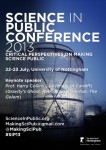
Science in the Public Conference 2013 Poster
(with thanks to many prolific and interesting conference Tweeters)
This year was the seventh Science in Public conference and took place at the University of Nottingham, which is also the base for the Leverhulme Trust-funded Making Science Public project. There were over 120 participants from Austria, Brazil, Denmark, Germany, Ireland, Israel, Italy, Japan, Portugal, the United States and the UK and more than 25 panel sessions on topics from responsible innovation to storytelling and public engagement to the dilemmas of making expertise public.
Sophia Collins
@sophiacol
Come to my #SIP13 session on storytelling. Stories! A ukulele! And a week-old baby!
Science in Public is the conference gathering for a diverse network of researchers and practitioners working in a broad swathe around the relationship between science and technology and the public. Participants came from many disciplines, including science and technology studies, geography, cultural studies, media and film studies, sociology, science communication, development studies, English literature, policy and political studies.
Beverley Gibbs
@bevgibbs
This kind of interdisciplinarity is always a highlight of the Science in Public conferences. #sip13
One panel was a unique joint event, using a Google hangout to link with a simultaneous panel at the International Congress for History of Science, Technology and Medicine, at Manchester University.
ICHSTM 2013
@ichstm2013
Livestream of #ichstm #Sip13 link-up “Social media, public engagement & HSTM”
The keynote speaker, Professor Harry Collins, asked Can scientists show their working? Collins challenged the view that if scientists revealed more of their work to the public, then people would be able to contribute more to democratic decision-making. Acknowledging that it is, at the very least, unpopular to argue against democracy, he argued openness is an unrealistic dream, both because the intricacies of scientific knowledge are difficult to understand, even by other experts, and because disputes within science take a completely different pattern to those in the ‘real world’.
Bishop Hill
@aDissentient
Sociologist Harry Collins apparently says lay people can’t understand science. How does he know? #sip13
Harry Collins suggested that primary knowledge can be ‘dangerous’ in the hands of lay people and that learning how to disentangle the good stuff from the dross takes effort and time. For him, the art of science is to take a particular problem and produce a reasonable consensus answer; the real world, however, requires certainty. ‘Showing one’s working’ can’t be done; there’s too much to show and the inside is too different from the outside.
Jon Treadway
@jontreadway
One of the more unusual keynote speeches I have seen. #sip13
Given his audience, Collins could have expected to get a few challenges in return. He might initially have knocked us back in our seats but by and large, we bounced back fighting. Many participants crowded into the following panel, in which several speakers discussed ‘Collins in context’ – the relationship among science, expertise, politics and publics.
Sara Mynott
@SaraMynott
Collins paper under discussion at #sip13: The politics and policy of the Third Wave: new technologies and society
The next panel was the one in which I was presenting. Follow that! – I discussed some results from my PhD research that investigated the role of open science in sustaining public engagement. It was … interesting. I had to admit I disagreed with the distinguished Professor C. For some researchers, I believe, being open is a duty; simply the proper way to conduct research. For others, receiving public funding carries an obligation to make their research publicly available. Making research open not only increases the return, by enabling re-use and re-purposing of research, but also enables researchers to show the public value of their work.
Laura Carletti
@lauracarletti
To be open (democratic and inclusive) or not to be open (oligarchic and exclusive): that’s the question … for scientists #sip13
First session of the second day (Science fiction and the social construction of science) and I learned that Arizona State University has a Center for Science and Imagination. Can imagination be centred, I wonder? Great presentation on the development of the idea of the detective and the ‘mad scientist’ in nineteenth-century fiction but felt quite lost during the next one on ‘the source of magic’.
Then an excellent session on what exactly is responsible innovation; does science have to be FOR something and how can we move from retrospective accountability to prospective care and responsiveness.
Beltane PE Network
@edbeltane
@Jackstilgoe session on What is responsible innovation? Points out that no one supports irresponsible stagnation! #sip13
Closed the day at the session on public engagement and the emergent politics of public mediation, covering the representation of science in Make magazine, and two far-too-quick skips through the highlights of the Sciencewise Which Publics? When?’ report and the Creating Publics project.
Sara Mynott
@SaraMynott
Nick Mahoney tackles the question of what the ‘public’, in public engagement, means. #sip13
Which is a useful, if circular, point at which to finish!
